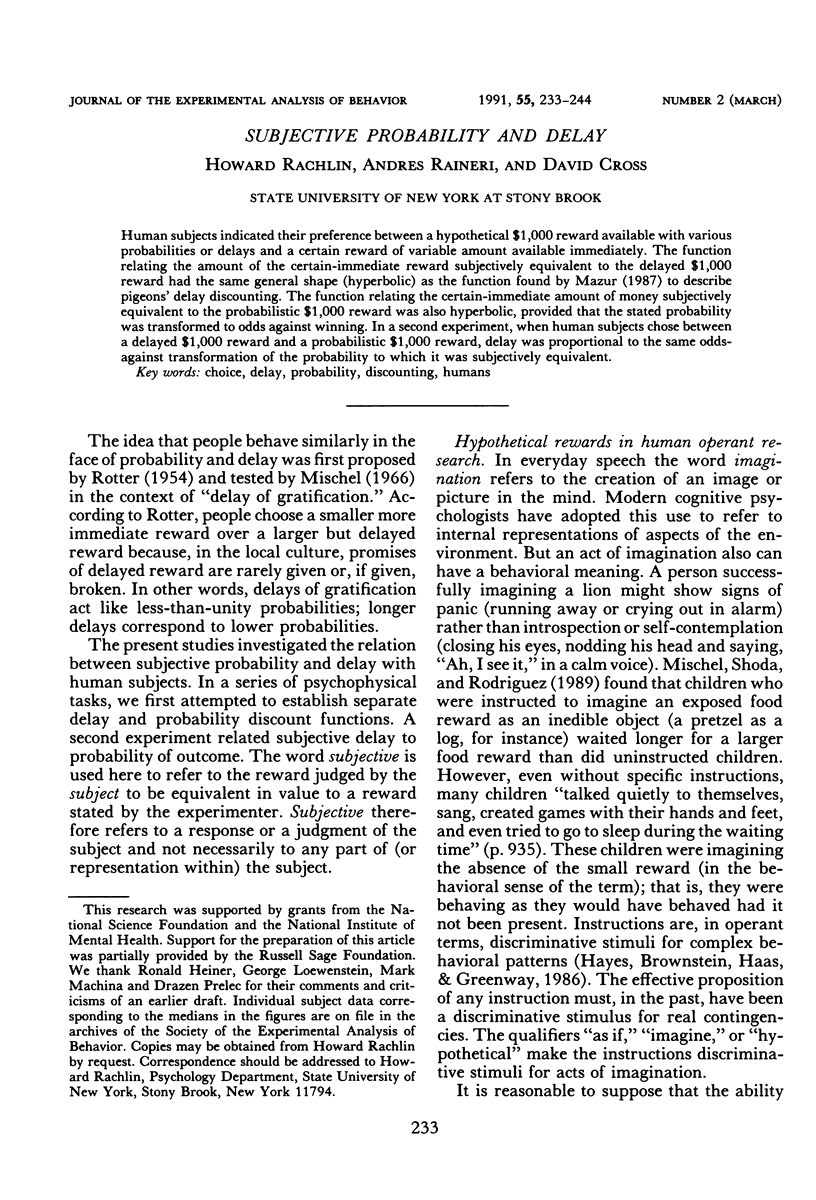Subjective probability and delay (original) (raw)
Abstract
Human subjects indicated their preference between a hypothetical 1,000rewardavailablewithvariousprobabilitiesordelaysandacertainrewardofvariableamountavailableimmediately.Thefunctionrelatingtheamountofthecertain−immediaterewardsubjectivelyequivalenttothedelayed1,000 reward available with various probabilities or delays and a certain reward of variable amount available immediately. The function relating the amount of the certain-immediate reward subjectively equivalent to the delayed 1,000rewardavailablewithvariousprobabilitiesordelaysandacertainrewardofvariableamountavailableimmediately.Thefunctionrelatingtheamountofthecertain−immediaterewardsubjectivelyequivalenttothedelayed1,000 reward had the same general shape (hyperbolic) as the function found by Mazur (1987) to describe pigeons' delay discounting. The function relating the certain-immediate amount of money subjectively equivalent to the probabilistic 1,000rewardwasalsohyperbolic,providedthatthestatedprobabilitywastransformedtooddsagainstwinning.Inasecondexperiment,whenhumansubjectschosebetweenadelayed1,000 reward was also hyperbolic, provided that the stated probability was transformed to odds against winning. In a second experiment, when human subjects chose between a delayed 1,000rewardwasalsohyperbolic,providedthatthestatedprobabilitywastransformedtooddsagainstwinning.Inasecondexperiment,whenhumansubjectschosebetweenadelayed1,000 reward and a probabilistic $1,000 reward, delay was proportional to the same odds-against transformation of the probability to which it was subjectively equivalent.

Selected References
These references are in PubMed. This may not be the complete list of references from this article.
- Ainslie G. W. Impulse control in pigeons. J Exp Anal Behav. 1974 May;21(3):485–489. doi: 10.1901/jeab.1974.21-485. [DOI] [PMC free article] [PubMed] [Google Scholar]
- Hayes S. C., Brownstein A. J., Haas J. R., Greenway D. E. Instructions, multiple schedules, and extinction: Distinguishing rule-governed from schedule-controlled behavior. J Exp Anal Behav. 1986 Sep;46(2):137–147. doi: 10.1901/jeab.1986.46-137. [DOI] [PMC free article] [PubMed] [Google Scholar]
- Mischel W., Grusec J. Waiting for rewards and punishments: effects of time and probability on choice. J Pers Soc Psychol. 1967 Jan;5(1):24–31. doi: 10.1037/h0024180. [DOI] [PubMed] [Google Scholar]
- Mischel W., Shoda Y., Rodriguez M. I. Delay of gratification in children. Science. 1989 May 26;244(4907):933–938. doi: 10.1126/science.2658056. [DOI] [PubMed] [Google Scholar]
- Mischel W. Theory and research on the antecedents of self-imposed delay of reward. Prog Exp Pers Res. 1966;3:85–132. [PubMed] [Google Scholar]
- Rachlin H., Green L. Commitment, choice and self-control. J Exp Anal Behav. 1972 Jan;17(1):15–22. doi: 10.1901/jeab.1972.17-15. [DOI] [PMC free article] [PubMed] [Google Scholar]
- Silberberg A., Murray P., Christensen J., Asano T. Choice in the repeated-gambles experiment. J Exp Anal Behav. 1988 Sep;50(2):187–195. doi: 10.1901/jeab.1988.50-187. [DOI] [PMC free article] [PubMed] [Google Scholar]